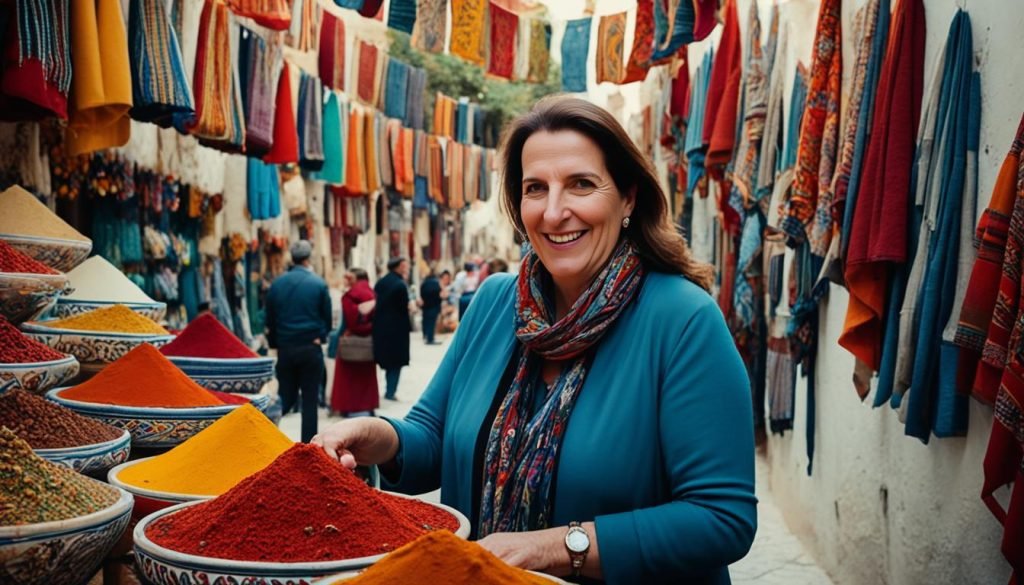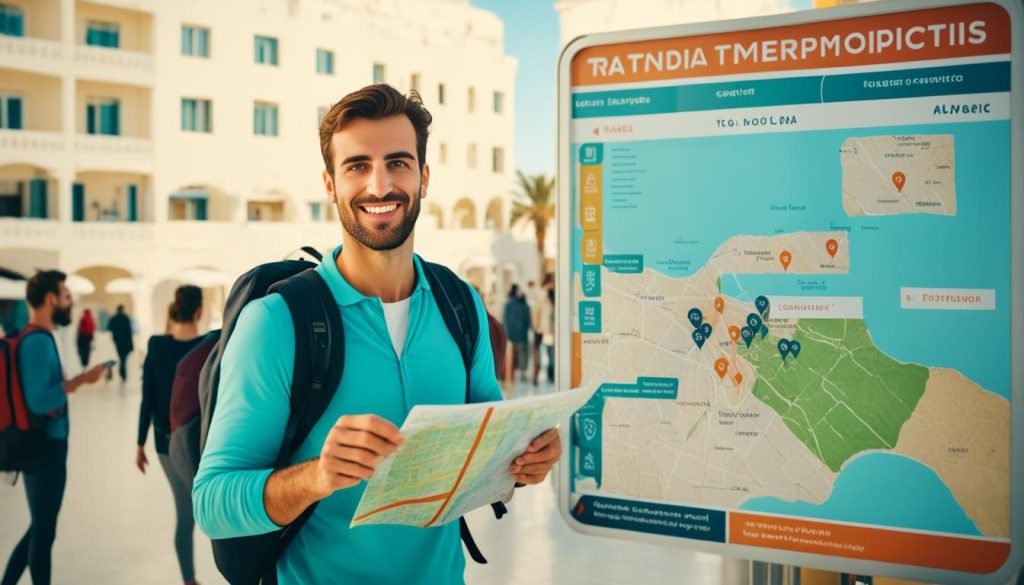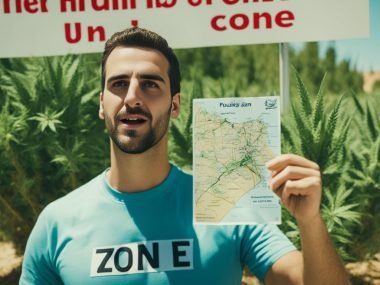Tunisia captivates with its rich history and Mediterranean beauty. Remembering my walks through peaceful Sidi Bou Said streets, I understand these moments are vital for any traveller. Yet, one must ask: Can you leave your hotel in Tunisia? With safety and rules in mind, the urge to explore battles with travel limits. Tunisian markets and ancient Carthage ruins call out for visitors, waiting for the right guidance.
In the bright Tunisian sun, safety casts a shadow of its own. The Foreign, Commonwealth & Development Office (FCDO) shines a light for travelers. They advise against visiting certain areas because of security issues. One must balance the wish to explore with following Tunisia’s tourist guidelines.
In this stunning land, the wish to see more is strong. But we must always be careful. Let’s follow local advice, avoiding risky areas, and moving safely within allowed boundaries.
Key Takeaways
- Being informed about the FCDO advisories is crucial for anyone considering leaving their hotel in Tunisia.
- Understanding the current security climate is essential to ensure personal safety while experiencing the richness of Tunisia.
- Areas within close proximity to the Libyan border and the Chaambi Mountains National Park are currently under more stringent travel advisories.
- The state of emergency can impact movement, so staying up to date with Tunisia travel restrictions and local news is paramount.
- Tunisia tourism guidelines are there to protect travellers, adhering to them is a responsibility we must all take seriously.
Understanding the Current State of Affairs in Tunisia
As a traveller to Tunisia, staying informed about the country’s current state is crucial. This includes understanding safety and security due to recent political changes. The changes have influenced how I plan my hotel stay and movements. It’s important to keep up with Tunisia’s travel restrictions and hotel rules. I aim to provide clear insights to help make your visit smooth and secure.
Current Political Climate and Safety Measures
The political scene has become tense after parliamentary elections. This calls for extra care outside hotels in Tunisia. While the increased security measures provide some reassurance, they also remind us to always be watchful.
Security Advisories and Areas to Avoid
Traveling in Tunisia involves checking the latest travel advisories. Certain regions, particularly near the Algerian and Libyan borders, are riskier. The FCDO often advises to avoid these areas unless necessary. It’s vital to consult advisories before making travel plans away from your hotel.
The Implications of a State of Emergency on Movement
The state of emergency in Tunisia has led to more checkpoints and sudden curfews. These measures can affect when and how one travels. Keeping up with the guidance from local authorities is key to understanding these restrictions.
Being mindful of hotel protocols and the country’s security measures is key to a safe trip. It affects how I plan my stay and outings in Tunisia. By staying informed and cautious, I aim to face these challenges smartly.
Navigating Tunisia’s Safety and Security Landscape
In my travels, I’ve seen how quickly strikes and demonstrations can start in Tunisia. They can become violent fast. So, I always check Tunisia travel restrictions as part of planning my trip. This is for my safety. I want to share tips on how to stay safe and think about whether to leave your hotel in Tunisia.
Tunis and other big cities in Tunisia are lively with tourists. Yet, they can also see public unrest. Strikes and protests often start over political or economic issues. I have some key ways to stay safe while you think about leaving hotel Tunisia:
- Keep up to date with local news and trustworthy alerts.
- Have backup plans and be ready to change your travel plans.
- Try not to stand out too much.
- Avoid big crowds and protests. They could be dangerous.
Recently, there’s been a rise in harassment cases reported by travellers. This shows we need to be more careful about our safety. Here’s what you can do:
- Walk in groups when outside, especially in the evening.
- Always watch over your belongings.
- Don’t tell strangers your personal details.
Staying safe in Tunisia needs careful planning and smart thinking. Remembering these tips can make your trip safer and more enjoyable. This way, your leaving hotel Tunisia experience can be great, without risking your safety.
Adhering to Tunisia’s Local Laws and Customs During Your Stay
When I explore Tunisia, I balance my curiosity with respect for the local culture. The Tunisia tourism guidelines show how to respect the country’s laws and traditions. Knowing this helps me venture from my hotel while honouring Tunisia’s societal norms.
Respecting Cultural Norms and Practices
I’ve learned how important it is to respect the local culture. This means dressing modestly and being considerate, especially during religious events. Following these Tunisia accommodation rules lets me experience the real Tunisia respectfully.

Being humble in markets and religious sites leads to wonderful connections. This respect opens doors to the rich history of the Tunisian people.
Legal Obligations for Tourists
Following Tunisia’s laws is crucial for tourists. I know that staying aware of my legal duties ensures a trouble-free visit. The Tunisia tourism guidelines stress the importance of respecting the law outside of hotel safety.
| Understanding | Expectations | Consequences |
|---|---|---|
| Tunisian Legal Systems | Abide by laws | Safe and legal stay |
| Cultural Practices | Respect and align actions | Harmonious interactions |
| Religious Norms | Observe and honour | Inclusive and enriching experiences |
| State of Emergency Regulations | Stay informed and compliant | Uninterrupted travels |
Tunisia is a place where culture and law blend beautifully. By following these guidelines, my journey is filled with respect, safety, and genuine experiences.
Tunisia’s Travel and Hospitality Industry Amidst COVID-19
The COVID-19 pandemic has changed Tunisia’s travel sector deeply. It’s caused big changes in how hotels work. Now, visitors need to get used to new ways of travelling and staying in Tunisia. The government has introduced rules to protect everyone in hotels.
Impact of Health Measures on Hotel Policies
Travel during a pandemic brings new kinds of challenges. Health measures change many parts of staying in a Tunisian hotel. Looking into Tunisia accommodation rules, I found that hotels have adjusted their policies. Guests now face different rules which can affect their stays.
Adaptations in Hotel Operations and Guest Expectations
Hotels in Tunisia have changed a lot to follow health guidelines. They are trying to deal with guests’ safety and cleanliness worries before they even arise. This means changes to things like the Tunisia hotel check-out policy. Guests now look for places that prioritize health and safety.
| Hotel Operation | Pre-COVID Practice | Current Adaptation |
|---|---|---|
| Check-In/Out Process | Traditional face-to-face | Contactless systems, scheduled timings |
| Dining Arrangements | Buffet Service | À la carte, distance seating or in-room dining |
| Amenities Access | Open access to facilities | Regulated use with sanitation intervals |
| Housekeeping Services | Daily, standardized | On demand, enhanced cleaning protocols |
| Guest Interactions | Social events, guided tours | Limited capacities, virtual engagement options |
Tunisia’s travel sector is showing its strength by adapting to these tough times. If you’re planning a hotel stay Tunisia-style, it’s smart to learn about these changes. This can help make your visit both safe and fun.
Exiting Your Hotel: Exploring Tunisia’s Rich Culture and Attractions
I’m excited to explore Tunisia’s historic sites and vibrant markets. It’s important to know about Tunisia’s travel guidelines. Knowledge about travel restrictions and hotel stays in Tunisia is essential.
The beauty of Tunisian culture is tempting. I aim to enjoy my trips safely. A good plan balances spontaneity and strategy. It follows local advisories and changes plans when needed.
Safely Planning Excursions Outside Your Hotel
Talking to hotel staff or a local tour guide is my first step. They know the latest travel advisories. Being flexible is vital for safe and scenic travel.
Transportation Methods and Tips for Tourists
Choosing how to travel in Tunisia is key. Here’s a look at your options:
| Mode of Transport | Area Served | Considerations |
|---|---|---|
| Taxis | Urban and Tourist Areas | Ensure the meter is running to avoid overcharges |
| Buses (TRANSTU, SNTRI, Trans-Tour) | Urban to Remote Areas | Know your routes and stops, as schedules can be sporadic |
| Rail Travel | Major Cities and East Coast Towns | Comfortable but check timetables in advance |
| Driving (Requires IDP) | Countrywide | Variable road conditions; caution needed, especially at night |
Driving in Tunisia offers beautiful views of the landscape. It requires an International Driving Permit and caution, especially due to unpredictable roads.
Understanding and preparation are crucial for traveling in Tunisia. With careful planning and the right transport, Tunisia’s culture and attractions are within reach. They promise unforgettable experiences, like watching the sun set over the Sahara.
The Logistics of Leaving Your Accommodation
Preparing to leave hotel Tunisia for your next adventure requires careful planning. Make sure you get the right travel permits, especially if you’re heading to see the Sahara. These permits are a must for restricted areas and can take time to obtain.

If you’re planning to explore the desert, hire a knowledgeable guide. The desert’s vastness can be tricky and even dangerous. A good guide, which your hotel stay Tunisia can help find, ensures a safe journey.
It’s important to register your travel plans with the National Guard’s Tourism Brigade. This keeps you safe while you enjoy Tunisia’s stunning sceneries. It lets local authorities know where you are, giving you peace of mind.
| Preparation Step | Details | Why It’s Important |
|---|---|---|
| Travel Permits for Desert Areas | Mandatory for off-the-beaten-path excursions | Ensures legal access and safety in restricted zones |
| Licensed Guide Engagement | Guides with certification and experience in desert navigation | Provides expertise and local knowledge, enhancing safety |
| Registering with Tourism Brigade | Providing travel details to the National Guard’s Tourism Brigade | Makes your movements known to local authorities for emergency support |
Considering a self-drive tour from your hotel stay Tunisia? Remember, an International Driving Permit (IDP) is critical. It’s legal proof you’re allowed to drive and acts as a translated version of your licence.
Detailing these logistics means your transition from the hotel to experiencing Tunisia will be smooth. It also ensures your holiday complies with local laws. This preparation leads to a hassle-free and exciting exploration.
Hotel Check-Out Procedures and Inter-Hotel Transfers
As I finish my trip in Tunisia, it’s important to talk about the Tunisia hotel check-out policy. It’s also key to know how to switch hotels smoothly. Knowing this makes leaving as easy as your stay was.
Understanding Hotel Check-Out Policies in Tunisia
Before you leave your hotel in Tunisia, knowing the check-out rules is crucial. This includes paying for any extra costs from your stay. I’ve found that being aware of these details ahead of time makes leaving quicker. Remember, charges and check-out times can differ, so checking with the front desk the day before you leave is wise.
Arranging Smooth Transitions Between Accommodations
Moving from one hotel to another smoothly requires good planning. Make sure you know the check-in rules of your next hotel. Tell them when you’ll arrive, especially if it’s not during normal check-in times. If you need a ride, ask the hotel for help or suggestions to follow the Tunisia tourism guidelines.
If you’re driving yourself, keeping updated on road conditions is essential. Be aware of any issues like roadworks or protests that could affect your trip. This knowledge is crucial for a hassle-free journey through the dynamic Tunisia tourism scene.
Ensuring Your Safety When Leaving Hotel Premises
Thinking about leaving the hotel in Tunisia, I know how crucial personal safety is. Following the hotel rules, understanding safety, and knowing the travel restrictions are key. They help me keep all travellers safe.
Recommendations for Personal Security Measures
Stepping out of your hotel means you need to be very aware of your surroundings. It’s important to avoid places known for trouble. Keeping a low profile and looking after your belongings is also vital. Acting in a way that fits in locally can protect you on your travels in Tunisia.
Emergency Services and Assistance in Tunisia
If you find yourself in a tough spot, knowing how to reach emergency services is vital. Remembering the numbers for the police, ambulance, and civil protection is crucial. This knowledge is your safety net, ensuring help is on the way when needed.
| Service | Contact Number | Area |
|---|---|---|
| Police Assistance | 197 | Cities |
| National Guard | 193 | Rural Areas |
| Ambulance | 190 | Nationwide |
| Civil Protection | 198 | Nationwide |
Knowing about these services gives peace of mind and links you to help. As I explore Tunisia’s rich culture, I’m committed to a safe and enjoyable trip for all travellers.
Conclusion
When asking, “Can You Leave Your Hotel In Tunisia?”, the answer isn’t simple. Travellers need to look at many things. This includes changes in safety and security in different areas. It’s vital for a traveller to understand Tunisia’s tourism rules well. By doing this, they can have a fun visit without much worry.
It’s very important to know the local laws and customs. This helps build mutual respect and avoids problems. Following the hotel’s check-out rules is key for a smooth stay. Also, staying updated on health guidelines is crucial during the ongoing pandemic.
Choosing to explore beyond your hotel comes with personal responsibility. I believe in staying informed, respecting the culture, and following safety advice. Travel is about making lasting memories. With the right knowledge, a visit to Tunisia can be unforgettable for good reasons.







